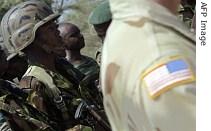2007年VOA标准英语-US Creates Military Command for Africa(在线收听)
Pentagon
06 February 2007
The Bush administration has announced the creation of a new U.S. military command for Africa by September of next year. The long-anticipated move will consolidate responsibility for U.S. military activities on the continent under one top-level commander, rather than dividing responsibility for Africa among three commanders whose primary duties are elsewhere. VOA's Al Pessin reports from the Pentagon.
 |
| A Kenyan contingent prepares for a simulated joint military exercise with US forces (18 August 2006) |
The assistant secretary of defense for African affairs, Theresa Whelan, says the move is designed to provide more focus for the U.S. military's efforts in an increasingly important part of the world.
"The decision was made based on an analysis of the changing environment, the changing global security environment, and the changing role of Africa in that global security environment," she noted.
Whelan says Africa Command will embody a key phrase from a major Defense Department policy document published last year.
"It goes, 'we want to prevent problems from becoming crises and crises from becoming catastrophes.' And Africa Command is going to sort of put that phrase in action," she added.
Whelan says while other U.S. regional commands focus on using diplomacy and combat power to address problems, Africa Command will have larger diplomatic and aid components and will focus on helping local governments prevent problems ranging from terrorism to AIDS.
"Africa Command is not going to reflect a U.S. intent to engage kinetically in Africa," she said. "This is about prevention. This isn't about fighting wars."
Still, the chairman of the House of Representatives Africa subcommittee, Congressman Donald Payne, expressed concern in a VOA interview about how the creation of Africa Command will be seen by ordinary Africans and their governments.
"I think there'll be a lot of skepticism, because there has been so little attention given to Africa, as other regions have gotten," he said. "All of a sudden to have a special military command, I think the typical person would wonder why now and really what is the end game?"
Congressman Payne says he wishes the Bush administration had consulted with his committee before creating Africa Command. But he says if part of the emphasis is on training African militaries in human rights and respect for civilian authority, that will be a good thing.
Assistant Secretary Whelan says training is part of the plan, and that now that President Bush has made his decision official, she and others in the U.S. government will be consulting with African governments about how to move forward.
"We've decided that we're going to take the journey," she said. "We've decided the vehicle we want to drive in. But what we don't know really is what path we want to take. And that's what we want to go and consult with the Africans on so that we essentially take the journey with them."
Theresa Whelan says in her more than 15 years working on African issues, she has frequently heard African leaders call for the creation of a single U.S. military command for the continent.
"We have been listening and we have heard the perspectives from our colleagues, our partners, in Africa," she said. "This is a response to both that and to also our evolving strategic and security needs."
Former Assistant Secretary of State for African Affairs Chester Crocker welcomed the creation of Africa Command.
"It has the potential to add additional coherence, or to overcome incoherence in the way we approach this region," he said. "Africa is a region of weak states, sometimes failing states. So one is hoping that by being able to do some capacity-building and upgrading the skill set of African militaries that they will be in a stronger position to participate in regional peacekeeping operations, for example."
But the former official, who now teaches at Georgetown University, cautions that the increased U.S. military focus on Africa must be managed carefully.
"I don't think that one would want people to draw the impression from this announcement that American policy toward Africa is becoming militarized," he added. "That isn't really the point. The point is let's have a coherent approach, strategic approach to the region."
Crocker says that message needs to be delivered to African governments, and Assistant Secretary Whelan says she plans to do exactly that.
An Africa Command transition team will begin work soon at European Command headquarters in Germany. Eventually, Theresa Whelan says, the Defense Department hopes to establish Africa Command headquarters somewhere on the continent, or perhaps at several locations.
The increased focus on Africa by the U.S. Defense Department has been in the works for years. A series of aid initiatives has delivered military training and civilian construction projects to many countries on the continent. And a policy document issued by the department a year ago identified Africa as a "key operational area" for the U.S. military.
In the current structure, most of Africa falls under European Command. Assistant Secretary Whelan says the countries of North Africa will continue to maintain a relationship with that command, particularly regarding cooperation with NATO. But she says most of their dealings with the U.S. military will be shifted to Africa Command. East Africa, which is now under Central Command, and Mauritius and Madagascar, which are under Pacific Command, will also shift to Africa Command.